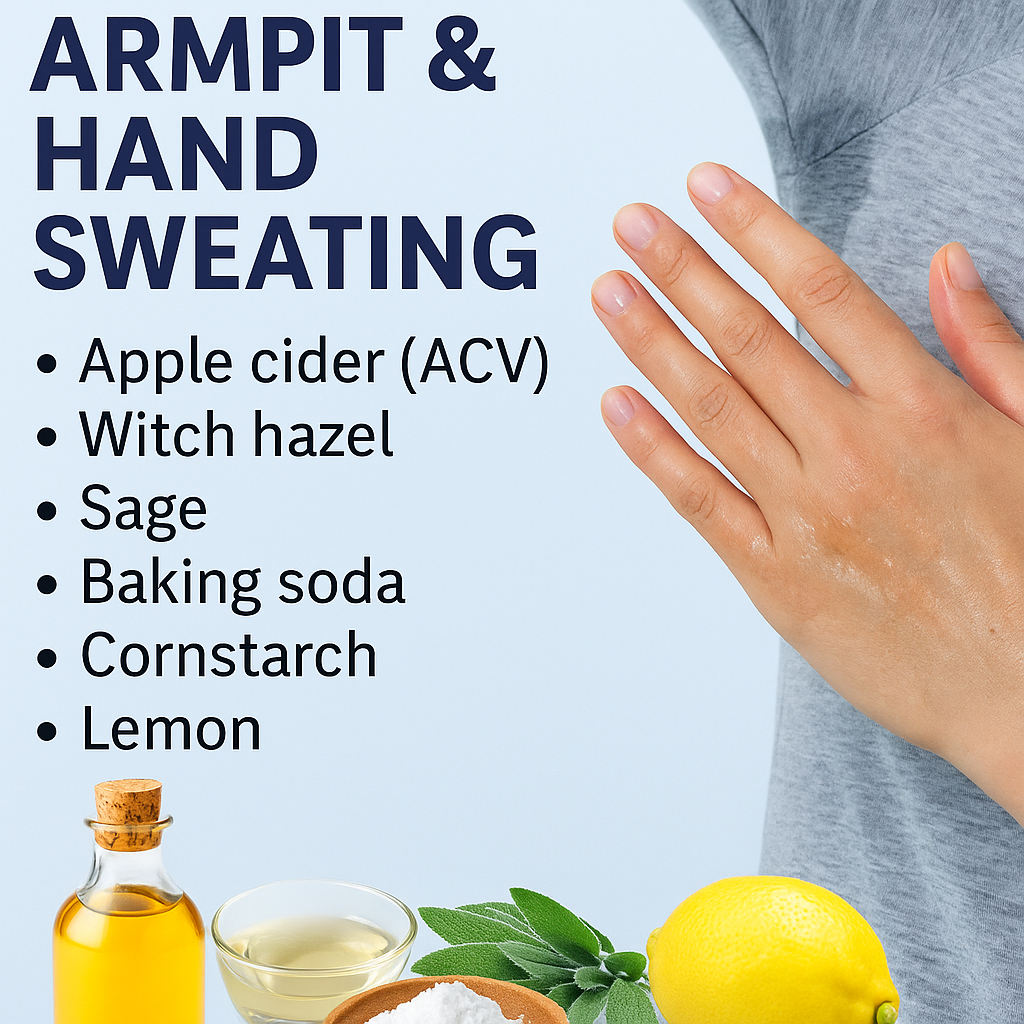Natural Way To Fix body Armpits and Hands Sweating
Primary hyperhidrosis, a disorder characterized by hyperactive sweat glands, can result in excessive perspiration, particularly in the hands and armpits. Addressing the underlying reason is crucial if secondary hyperhidrosis, another medical condition, is the source of the sweating. Here are some efficient and all-natural ways to control or lessen perspiration for individuals looking for natural solutions:
Apple Cider Vinegar (ACV):
How it works: ACV balances pH levels and acts as a natural astringent, reducing sweat.
How to use:
Externally: Dab ACV on armpits and palms using a cotton ball before bed. Wash off in the morning.
Internally: Mix 1–2 tablespoons in a glass of water and drink daily (optional: add honey for taste).
Tip: Test a patch on your skin first to avoid irritation.
Witch Hazel:
How it works: A natural antiperspirant that tightens skin and shrinks pores.
How to use:
Apply witch hazel extract with a cotton ball to armpits or palms once or twice daily.
Sage Tea or Sage Soak:
How it works: Sage has high levels of tannic acid, which dries up sweat and calms nerves.
How to use:
Drink: Brew 1–2 tsp of dried sage in hot water, steep for 10 mins, drink once daily.
Soak: Soak hands or armpits in cooled sage tea for 15 minutes daily.
Baking Soda and Cornstarch:
How it works: Absorbs moisture and neutralizes odor.
How to use:
Mix equal parts baking soda and cornstarch.
Dust on clean, dry armpits or hands.
Leave on for 20–30 minutes, then rinse.
Lemon Juice:
How it works: Natural astringent and deodorizer.
How to use:
Rub a lemon slice or apply juice under arms.
Let it sit for 10–15 minutes, then rinse.
Caution: Avoid if you have just shaved, as it may sting.
Diet Adjustments:
Avoid sweat-triggering foods:
Spicy foods
Caffeine
Processed sugar
Alcohol
Add sweat-reducing foods:
Water-rich fruits (watermelon, cucumber)
Magnesium-rich foods (spinach, almonds)
Herbal teas (chamomile, green tea)
Stay Hydrated:
Drinking lots of water helps regulate body temperature, which may reduce sweating.
Essential Oils (e.g., Tea Tree Oil):
How it works: Antibacterial and drying effect.
How to use:
Dilute a few drops of tea tree oil with a carrier oil (like coconut oil).
Apply to affected areas with a cotton swab.
Relaxation Techniques:
Why it helps: Anxiety and stress can trigger sweating. Managing stress can reduce episodes.
Try:
Deep breathing exercises
Meditation
Yoga
Progressive muscle relaxation
When to See a Doctor:
If natural remedies don’t provide relief or sweating interferes with daily life, consult a healthcare professional. You may have:
Hyperhidrosis (may require prescription treatment)
Hormonal imbalance
Thyroid issues
Infections or other underlying health conditions
Final Remarks:
Managing excessive perspiration from your hands and armpits may be significantly improved by including natural treatments into your daily routine. Consistency is essential for optimal outcomes, even though these techniques are mild and often harmless. Always pay attention to your body; if discomfort develops or symptoms worsen, it’s critical to see a doctor. You may successfully and naturally restore your self-esteem and comfort in your skin by integrating good cleanliness, natural remedies, and a healthy lifestyle.

